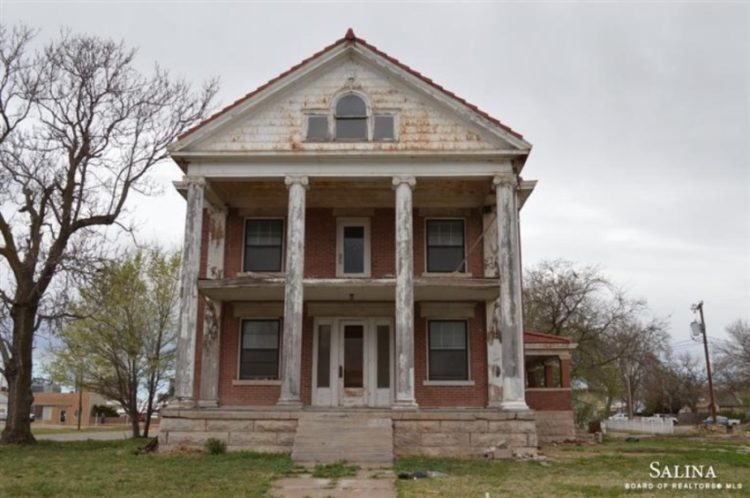
PHOTO: Zillow. 200 Court Ave. Ellsworth, Kansas
Dec. 13. By Robert Grunnah. You may still be reeling from the loss of a loved one when it’s brought to your attention that you’ve been included in their will. Being a beneficiary of someone else’s generosity can be a blessing — but in certain situations, it might feel more like a curse.
If you’ve inherited a home, that could go either way. For some, inheriting the family home can be a great way to earn equity and gain a valuable asset that can help you savor treasured memories. But for others, an inheritance like this can be a huge source of contention or may even represent a major financial burden.
After a loved one’s passing, you may feel completely overwhelmed by the idea of figuring out what to do with your inherited property. But it’s essential that you make a plan with some actionable next steps in order to make sound decisions for yourself and your family. Subsequent to finding out you’ve inherited a house, here’s what you’ll want to do next.
Tax implications
When assets are divvied out through a will, these gifts may come with certain strings attached. One of the first things that beneficiaries want to know is whether they’ll be required to pay taxes on an inherited home.
The good news is that there is no federal inheritance tax and that there’s no automatic tax liability that applies upon inheriting a home. However, some states do have their own inheritance tax — and if you ultimately decide to sell the home, you will need to pay what’s called a capital gains tax on the property. If you go this route, you’ll be subject to step-up taxes, which are actually to your benefit; you’ll inherit the home at its fair market value and will be taxed only on the difference between that value and the final selling price.
There are tax implications for those who decide to keep these inherited properties, as well. You could be eligible for capital gains exclusion, provided you make this home your primary residence for at least two years during a five-year period and you haven’t used this exclusion on any property. If you qualify, you could potentially exclude up to $250,000 (or $500,000 if you file a joint tax return with your spouse) of the gain from your income.
It’s often a good idea to talk to an accountant to figure out which taxes would apply in your state and in your specific situation. This information can play a big factor in your final decision about what you’d like to do with the property.
Other financial responsibilities
Keep in mind that taxes aren’t the only monetary issue you’ll need to explore after inheriting a home. The property you inherit may be in poor condition, which means you may need to invest a significant amount of money into the home just to ensure it’s liveable. Even if the home is in fair condition now, it’ll also require maintenance over time.
It’s worth noting that the home may still have a mortgage, as well. Some mortgages contain a “due-on-sale” clause, which means the remaining part of the mortgage loan is due at once if the property is transferred to a new owner. However, there’s also a possibility that the previous owner’s estate paid off the mortgage before your inheritance took effect or that there was no mortgage at all. You’ll want to find out for sure before you proceed.
Own, rent or sell
Inherited properties can become even more complicated to sort out when there are multiple beneficiaries involved. But for the sake of argument, let’s assume that you’re the sole beneficiary of the inherited home. Generally speaking, your options are to…
—Move In: This can keep the property within your family, allowing you to preserve this real estate asset and secure a home in which to live. You’ll be responsible for any mortgage payments, property taxes, and maintenance fees that come along with the home, as well as potentially cleaning out any belongings that were left in the home upon your loved one’s death. Don’t forget that the emotional toll of living in this home could prove to be substantial, as could the financial implications of taking on homeownership in this manner.
—Rent It Out: If you’d like to retain ownership but have no interest in living in the home yourself, you could consider renting out the property and becoming a de facto landlord. This option could be appealing to those who are eager to become involved in real estate investing or are looking for another source of income. However, you should keep in mind that managing a property and keeping that property occupied can be a lot of work. And while you could incur some tax benefits for turning this into a rental property, it might not be as lucrative as you might think.
—Sell It: While you might not relish the idea of selling a home you’ve just inherited, this may be the most financially sound option. Not only will you eliminate certain legal and tax responsibilities, but you can walk away with money in your pocket without having to worry about making repairs. If you sell the inherited home to cash home investors, you can choose your closing date and avoid paying real estate commissions or waste time on open houses.
It’s not always easy to know what to do with an inherited property. But for many people, selling it to a cash home buyer can be the best way to move forward.

GRUNNAH
—Grunnah is the founder of Austin House Buyer, the leading cash house buyer in Austin, Texas, with over 1,200 properties purchased since 2004. As broker/owner of Castle Hill Investments, his firm renovates and re-sales over 100 houses and duplexes a year, providing quality homes to homebuyers and investors across the country.

Discussion
No comments yet.